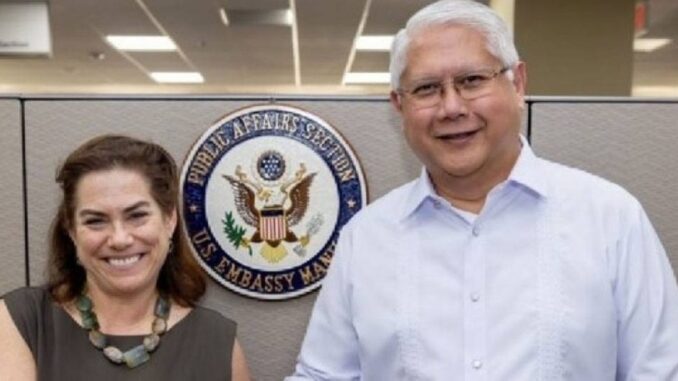
COMMISSION on Filipinos Overseas (CFO) Secretary Dante Ang II said participants in the United States government’s Exchange Visitor Program (EVP) should honor their commitment to return to the Philippines to “preserve” the integrity of the program.
Ang made the call on Nov. 21 when he and other CFO officials paid a courtesy visit to the US Embassy in Manila. He was accompanied by CFO Undersecretary Ma. Arlene Borja, Director Marita Del Rosario-Apattad, Kristine Gacer and Frencel Tingga.
Ang said EVP participants, who were issued J1 visas (exchange visitor visas), “should honor their responsibility” of returning to the Philippines to make the EVP program mutually beneficial to both countries.
US Embassy’s Counsellor for Public Affairs Jessica Simon and Ang discussed the implementation of the US-Philippines EVP.
The US Embassy officials “supported the Secretary’s stand and said that continued misuse of the J1 visa may jeopardize the program, and thus affect future applicants,” the CFO said in a statement posted on Facebook.
Commission on Filipinos Overseas Secretary Dante Ang II and US Embassy’s Counsellor for Public Affairs Jessica Simon. PHOTO FROM THE US EMBASSY IN MANILA
The EVP was created as part of the Mutual Educational and Cultural Exchange Act of 1961 or the Fulbright-Hays Act to allow foreign nationals to temporarily reside in the US and participate in a variety of education or training programs and to promote cultural exchange between the US and other countries, including the Philippines.
Under the arrangement of US-Philippines EVP, the CFO is part of the Philippine EVP Committee and provides online pre-departure services for J1 visa holders such as teachers, doctors, interns, summer work and travel participants, among others.
Both parties shared their respective data on EVP participants and administrative processes, including the CFO’s provision of pre-departure services, and discussed issues involving the participants.
Apattad and Gacer gave an overview and reported about the CFO’s J1 frontline service, including EVP-related concerns it handled.
Over 6,000 Filipinos participated in the EVP program in 2023, based on the records of the CFO and the embassy.
“While it is acknowledged that the EVP, having been in existence for more than seven decades, is one of the best practices between the US and Philippine diplomatic relations, the program is without flaws,” the CFO said.
Since EVP is a nonimmigrant training and cultural exchange program, participants “are expected to return to the Philippines after the end of their training/education, to transfer the knowledge and skills they have learned in their respective field or profession,” it added.
The CFO and the US Embassy have observed that many participants “misused” their J1 visa and opted not to return to the Philippines.
“While staying in the US may be personally and economically advantageous to participants, this leaves a gap in the pool of talents (brain drain) in the Philippines, especially in the cases of senior teachers or doctors,” the CFO said.
The CFO and the embassy made some proposals to improve the program and address the concerns of EVP participants.
These include offering other pathways when they return to the Philippines, such as securing a job, building a network of EVP alumni, data-sharing between two parties, broadening teacher participation but limiting the duration of the program, and reviewing and updating the Philippine Skills List, among others.


Be the first to comment